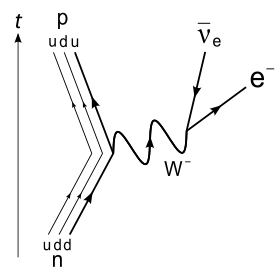
Lepton
A lepton is an elementary, half-integer spin (spin 1⁄2) particle that does not undergo strong interactions. Two main classes of leptons exist: charged leptons (also known as the electron-like leptons), and neutral leptons (better known as neutrinos). Charged leptons can combine with other particles to form various composite particles such as atoms and positronium, while neutrinos rarely interact with anything, and are consequently rarely observed. The best known of all leptons is the electron.
There are six types of leptons, known as flavours, forming three generations. The first generation is the electronic leptons, comprising the electron (e−) and electron neutrino (ν
e); the second is the muonic leptons, comprising the muon (μ−) and muon neutrino (ν
μ); and the third is the tauonic leptons, comprising the tau (τ−) and the tau neutrino (ν
τ). Electrons have the least mass of all the charged leptons. The heavier muons and taus will rapidly change into electrons through a process of particle decay: the transformation from a higher mass state to a lower mass state. Thus electrons are stable and the most common charged lepton in the universe, whereas muons and taus can only be produced in high energy collisions (such as those involving cosmic rays and those carried out in particle accelerators).

Greek lepton
The lepton, plural lepta (Greek: λεπτόν, pl. λεπτά) is the name of various fractional units of currency used in the Greek-speaking world from antiquity until today. The word means "small" or "thin", and during Classical and Hellenistic times a lepton was always a small value coin, usually the smallest available denomination of another currency. The coin in the lesson of the widow's mite (Mark 12:41-44, Luke 21:1-4) is referred to as a lepton and Luke's Gospel also refers to the lepton or mite when stating that a person who does not make peace with his adversary in good time will be required to pay 'to the very last mite' before being released from prison. The lepton was first minted under Alexander Jannaeus prior to 76 B.C.E.
In modern Greece, lepton (modern form: lepto, λεπτό) is the name of the 1/100 denomination of all the official currencies of the Greek state: the phoenix (1827–1832), the drachma (1832–2001) and the euro (2002–current) – the name is the Greek form of "euro cent". Its unofficial currency sign is Λ (lambda). Since the late 1870s, and until the introduction of the euro in 2001, no Greek coin had been minted with a denomination lower than 5 lepta.

Charles Wuorinen
Charles Peter Wuorinen (pronunciation: /ˈwɔːrɪnən/, born June 9, 1938) is a Pulitzer Prize-winning American composer of contemporary classical music based in New York City.
His catalog of more than 260 compositions includes works for orchestra, opera, and chamber music, as well as solo instrumental and vocal works. Salman Rushdie and Annie Proulx have collaborated with him. Wuorinen's work has been described as serialist, but he has come to disparage that term as meaningless.
Biography
Wuorinen was born on the Upper West Side of Manhattan in New York City. His father, John H. Wuorinen, was chairman of the history department at Columbia University and a noted scholar of Scandinavian affairs who also worked for the Office of Strategic Services and was the author of five books on his native Finland. His mother, Alfhild Kalijarvi, received her M.A. in biology from Smith College. Wuorinen excelled academically, graduating from Trinity School (New York City) as valedictorian in 1956; he later received a B.A. (1961) and an M.A. (1963) in music from Columbia University. Early supporters included Jacques Barzun and Edgard Varèse.
Ponç
Ponç or Ponc may refer to:
See also
PON
PON or Pon may refer to:
Business
Technology
Medicine/Chemistry
Religion
Fiction
Other

Pan (surname)
Pān is the Mandarin pinyin romanization of the East Asian surname 潘. It is listed 43rd in the Song dynasty classic text Hundred Family Surnames. It is romanized as P'an in Wade–Giles; Poon, Pon, or Pun in Cantonese; Phua in Hokkien and Teochew.
潘 is also a common surname in Vietnam and Korea. It is romanized Phan in Vietnamese and Ban or Pan in Korean.
Distribution
Pan 潘 is the 37th most common surname in mainland China and the 31st most common surname on Taiwan.
None of the romanizations of Pan 潘 appeared among the 1000 most common surnames during the 2000 US census.
Origins
As with many Chinese surnames, the origins of the Pan are various and sometimes legendary.
One origin was a clan name taken from a fief north of Shaanxi granted to Ji Sun, a descendant of King Wen of Zhou. Some members descend from Ji Sun himself, others from his vassals.
Another source was a cadet branch of the ruling House of Mi (芈) of the State of Chu during the Spring and Autumn period. Among these Pans, Pan Chong served as regent and advisor for the state of Chu. When King Cheng of Chu decided to make a younger son the crown prince, Pan Chong aided the elder prince Shangchen instead. Shangchen forced King Cheng to commit suicide and ascended the throne as King Mu of Chu. Pan Chong was made the "Royal Tutor".
Podcasts:

